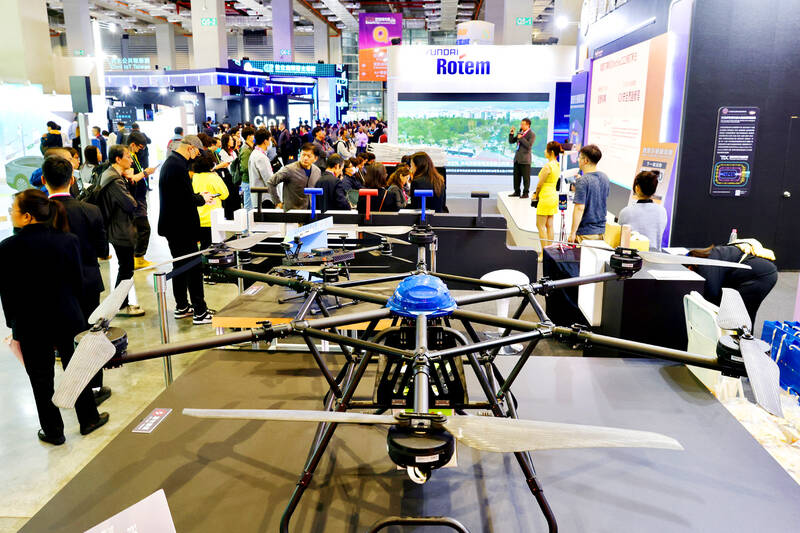The Smart City Summit & Expo (SCSE) and the Net Zero City Expo kicked off yesterday in Taipei, welcoming approximately 500 foreign guests from 112 cities in 46 countries.
The SCSE is being held for the 11th year, while the Net Zero City Expo is in its second year, jointly welcoming 495 city heads and city administrators from 112 cities and over 1,697 international professional buyers, Paul Peng (彭双浪), chairman of the event organizer Taipei Computer Association (台北市電腦公會), said at the opening ceremony.
The two expositions have been held together since last year, and involve enterprises and government departments sharing how 5G and artificial intelligence of things (AIOT) have been applied to building smarter and cleaner cities, Peng said.

Photo: Ritchie B. Tongo, EPA-EFE
The smart city expo will also take place in Kaohsiung tomorrow, and together the three exhibitions will host more than 600 companies and agencies presenting smart solutions on education, medical services, transportation, security and architecture, representing 13 percent growth from last year, Peng said.
National Development Council Minister Kung Ming-hsin (龔明鑫) said in his opening remarks that Taiwan used to be famous for Computex, the annual computer expo held in Taipei, "as hardware products are Taiwanese companies’ strength."
"Building a smart city involves leaping out of the hardware thinking box and finding solutions for future cities in advance," he said, adding that the goal of reaching net zero in 2050 is another step further in the development process.
The net zero city expo featured a city leaders summit yesterday that included several forums on different topics such as energy transition, just transition, and lifestyle transition.
Forums on net zero transition and global carbon market are to take place today and tomorrow, respectively, at Taipei Nangang Exhibition Center Hall 2.

SEMICONDUCTORS: The German laser and plasma generator company will expand its local services as its specialized offerings support Taiwan’s semiconductor industries Trumpf SE + Co KG, a global leader in supplying laser technology and plasma generators used in chip production, is expanding its investments in Taiwan in an effort to deeply integrate into the global semiconductor supply chain in the pursuit of growth. The company, headquartered in Ditzingen, Germany, has invested significantly in a newly inaugurated regional technical center for plasma generators in Taoyuan, its latest expansion in Taiwan after being engaged in various industries for more than 25 years. The center, the first of its kind Trumpf built outside Germany, aims to serve customers from Taiwan, Japan, Southeast Asia and South Korea,

Gasoline and diesel prices at domestic fuel stations are to fall NT$0.2 per liter this week, down for a second consecutive week, CPC Corp, Taiwan (台灣中油) and Formosa Petrochemical Corp (台塑石化) announced yesterday. Effective today, gasoline prices at CPC and Formosa stations are to drop to NT$26.4, NT$27.9 and NT$29.9 per liter for 92, 95 and 98-octane unleaded gasoline respectively, the companies said in separate statements. The price of premium diesel is to fall to NT$24.8 per liter at CPC stations and NT$24.6 at Formosa pumps, they said. The price adjustments came even as international crude oil prices rose last week, as traders

SIZE MATTERS: TSMC started phasing out 8-inch wafer production last year, while Samsung is more aggressively retiring 8-inch capacity, TrendForce said Chipmakers are expected to raise prices of 8-inch wafers by up to 20 percent this year on concern over supply constraints as major contract chipmakers Taiwan Semiconductor Manufacturing Co (TSMC, 台積電) and Samsung Electronics Co gradually retire less advanced wafer capacity, TrendForce Corp (集邦科技) said yesterday. It is the first significant across-the-board price hike since a global semiconductor correction in 2023, the Taipei-based market researcher said in a report. Global 8-inch wafer capacity slid 0.3 percent year-on-year last year, although 8-inch wafer prices still hovered at relatively stable levels throughout the year, TrendForce said. The downward trend is expected to continue this year,

Taiwan Semiconductor Manufacturing Co (TSMC, 台積電), which supplies advanced chips to Nvidia Corp and Apple Inc, yesterday reported NT$1.046 trillion (US$33.1 billion) in revenue for last quarter, driven by constantly strong demand for artificial intelligence (AI) chips, falling in the upper end of its forecast. Based on TSMC’s financial guidance, revenue would expand about 22 percent sequentially to the range from US$32.2 billion to US$33.4 billion during the final quarter of 2024, it told investors in October last year. Last year in total, revenue jumped 31.61 percent to NT$3.81 trillion, compared with NT$2.89 trillion generated in the year before, according to